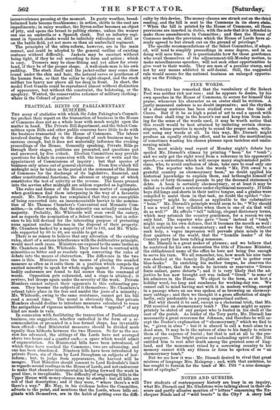FINE WORDS.
Mn. DISRAELI has remarked that the vocabulary of Sir Robert Peel was neither rich nor rare ; and he appears to desire, by his own speeches in the House of Commons, to secure for himself this praise, whenever his character as an orator shall be written. A justly-measured cadence is no doubt impressive ; and the rhythm of a closing sentence has been studied ever since the time of Cicero. But if it be so high a point of art to end a speech with tones that shall ring in the hearer's ear and keep him from look- ing for the sense of the words used, it may be worth notice that this result would be best attained by imitating certain chorus- singers, whose practice is merely to sound the proper notes, with- out using any words at all. In this way, Mr. Disraeli might produce an equally striking effect, and be saved the mortification of sometimes wasting his chosen phrases upon tasteless and undis, cerning minds.
The most widely read report of Monday night's debate has spoiled Mr. Disraeh's climax by printing "boon" for " tomb "; and we only get the right word from a reference in his opponent's speech,—a correction which will escape many singleminded politi- cians, who, to avoid confusion of ideas, take care to read only one side. The reporter who took the words "Mr. Pitt owed to a grateful country an eleemosynary boon," no doubt applied his historical knowledge to explain them, and bethought himself of the vote of forty thousand pounds to pay the deceased statesman's debts. A boon is certainly eleemosynary, or at least it may be called so to stuff out a sentence under rhythmical necessity. If little boys did longs and shorts in their native tongue, and a gradus were compiled to assist them in that task, no doubt the epithet "-elee- mosynary " might be classed as applicable to the substantive "boon." Mr. Disraeli's principle would seem to be, "Why should I use a word of two syllables when there is one of six that will do as well ?" He affects " tall" talking, elegant dictionary terms, which may astonish the country gentlemen, for a reason we can only hint. The reporter who gave "boon" instead of " tomb " might urge in his own defence, that it becomes the mouth as well.: but it certainly needs a commentary ; and we fear that, without such help, a vague impression will pervade plain minds in the four quarters of the world, that the "humble leader" of the Country party has been talkii.g nonsense. Mr. Disraeli is a great maker of phrases ; and we believe that he contrived for his own decoration the title of Finance Minister, the oldfashioned name of the office he bore not being fine enough to serve his turn. We all remember, too, how much his nice taste was shocked at the homely English advice "not to potter over blue-books." In enriching his mother tongue, he observes the rule of Horace, that the words he invents or renovates "Grieco fonte cadent, pane detorta "; and it is very likely that the ad- jective he has now brought out was indeed " Greek " to some of his admirers in the House. We object to the term, as at best a holiday word, too long and cumbrous for working-day use. We cannot call to mind having met with it in modern writing, except in a passage where an ass was spoken of as browsing on eleemosy- nary cabbage ; and then we thought it a gross affectation of singu- larity, only pardonable in a young unpractised author. But why should it be said, except as a rhetorical trick, that Mr. Pitt received an eleemosynary tomb ? The same might as appro- priately be stated of any pauper who is buried in his shell at the cost of the parish. As leader of the Tory party, Mr. Disraeli has necessarily a great reverence for Johnson, and therefore he will ac- cept the Doctor's explanation of " eleemosynary," which we find to be, "given in alms " : but it is absurd to call a tomb alms to a dead man. It may be in the nature of alms to his family to relieve them of the expense of burial ; but that is not at all to the pre- sent purpose. The bright genius and unbending spirit of Mr. Pitt entitled him to rest after death among the greatest sons of Eng- land, and the monument raised by a sorrowing country to his memory cannot With any fitness or force be spoken of as "an eleemosynary tomb." But we see how it was : Mr. Disraeli desired to rival that great mistress of language Mrs. Malaprop ; and, with that ambition, he has sought to furnish for the tomb of Mr. Pitt "a nice derange- ment of epitaphs."


























 Previous page
Previous page